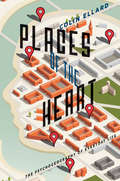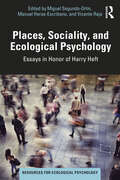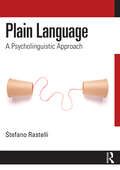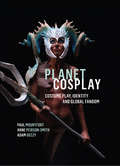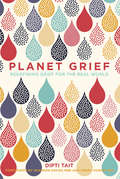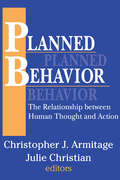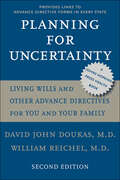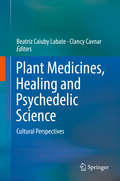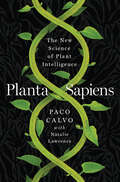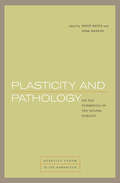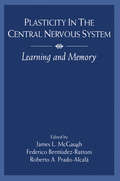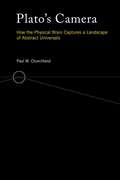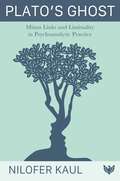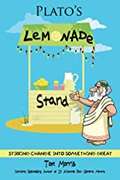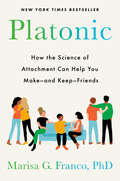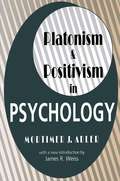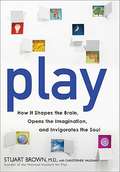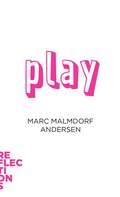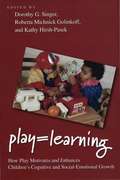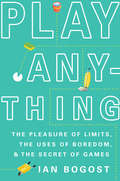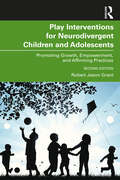- Table View
- List View
Places of the Heart
by Colin EllardA Selection of the Library of Science, History, and Military Book Clubs"One of the finest science writers I've ever read." -Los Angeles Times"Ellard has a knack for distilling obscure scientific theories into practical wisdom." -New York Times Book Review"[Ellard] mak[es] even the most mundane entomological experiment or exegesis of psychological geekspeak feel fresh and fascinating." -NPR"Colin Ellard is one of the world's foremost thinkers on the neuroscience of urban design. Here he offers an entirely new way to understand our cities-and ourselves." -CHARLES MONTGOMERY, author of Happy City: Transforming Our Lives Through Urban DesignOur surroundings can powerfully affect our thoughts, emotions, and physical responses, whether we're awed by the Grand Canyon or Hagia Sophia, panicked in a crowded room, soothed by a walk in the park, or tempted in casinos and shopping malls. In Places of the Heart, Colin Ellard explores how our homes, workplaces, cities, and nature-places we escape to and can't escape from-have influenced us throughout history, and how our brains and bodies respond to different types of real and virtual space. As he describes the insight he and other scientists have gained from new technologies, he assesses the influence these technologies will have on our evolving environment and asks what kind of world we are, and should be, creating.Colin Ellard is the author of You Are Here: Why We Can Find Our Way to the Moon, but Get Lost in the Mall. A cognitive neuroscientist at the University of Waterloo and director of its Urban Realities Laboratory, he lives in Kitchener, Ontario.
Places, Sociality, and Ecological Psychology: Essays in Honor of Harry Heft (Resources for Ecological Psychology Series)
by Manuel Heras-Escribano Miguel Segundo-Ortin Vicente RajaThis book presents a collection of essays honoring Professor Harry Heft, a leading figure in the field of ecological psychology, engaging critically with his work, thought and influence. Containing 12 chapters written by leading experts from philosophy and psychology, this text critically examines, questions, and expands on crucial ideas from Heft concerning the nature of cognition, its relationship to the body and the environment (including the social and cultural environment), and the main philosophical assumptions underlying the scientific study of psychological functions. It elaborates on the notion of affordance, and its connection to social, cultural and developmental psychology, as well as on the application of Roger Barker’s eco-behavioral program for current psychology and cognitive science. The book includes an extensive interview with Heft, where he reflects about the history, challenges and future of ecological psychology. Finally, it presents a chapter written by Heft, that offers a systematic response to the critical feedback. Given the increasing popularity of ecological psychology and the highly influential work of Harry Heft in related areas such as developmental, social and cultural psychology, and philosophy, this book will appeal to all those interested in the cognitive sciences from a scientific and philosophical perspective. It is also a must read for students of psychology, philosophy, and cognitive science departments.
Plain Language: A Psycholinguistic Approach
by Stefano RastelliPlain Language: A Psycholinguistic Approach employs principles from the field of psycholinguistics to explore factors that make a sentence or text easy or difficult to process by the cognitive mechanisms that support language processing, and describes how levels of difficulty might function within bureaucratic power structures.Drawing from experimental data on readability, the author employs a metaphor of three "ghost" readers in the mind that exist and interact with each other: the syntactic reader (the one searching for the structure), the statistical reader (the one driven by previous experiences), and finally the pragmatic reader (the one searching for meaning). The penultimate chapter concerns a novel psycholinguistic experiment showing that complexly written texts may prevent adult citizens with average literacy skills from accessing important information related to their health, work, and right to representation, thereby drawing a line between the psycholinguistics of language comprehension and the maintenance of existing power structures.Written in plain language itself, this book is designed to be easily understandable from an undergraduate level and makes for fascinating reading for all students and researchers in linguistics and psycholinguistics, as well as supplementary reading for students of sociolinguistics and related modules. Students, researchers, and interested general readers will develop an understanding that knowing how the mind reads and understands language can help stakeholders to ensure equal access to information and democratic processes.
Planet Claire, Suite for Cello and Sad-Eyed Lovers: A Memoir
by Jeff PorterThe second installment in Ann Hood’s Gracie Belle imprint challenges the traditional solemnity that characterizes nonfiction books of grief, loss, and sorrow.“Few readers will fail to be gripped by this tragically common story about death and what comes after for those left behind . . . A haunting and thought-provoking consideration of death and ‘how utterly it rips apart our lives.'” —Kirkus Reviews, Starred ReviewPlanet Claire is the story of the untimely death of the author’s wife and his candid account of the following year of madness and grief. As his life unravels, Porter analyzes his sadness with growing interest. He talks to Claire as if to evoke a presence, to mark a space for memory. He reports on his daily walks and shares observations of life’s sadness, while reminiscing about various moments in their life together. Like Orpheus, the author searches for a lost love, and what he finds is not the dog of doom but flashes of an intimate symmetry that brighten the darkest places of sorrow.The second title from Ann Hood’s Gracie Belle imprint, Planet Claire takes readers on a journey of sorrow that recalls memorable works by C.S. Lewis (A Grief Observed), Joan Didion (The Year of Magical Thinking), and Julian Barnes (Levels of Life). Porter’s memoir, however, is also playful, quirky, and self-ironic in a way that challenges the genre’s traditional solemnity. Like the novel Grief Is the Thing with Feathers by Max Porter, this is an unpredictably funny account of heartbreak, as if to say there’s something about the magnitude of loss that troubles even earnestness.
Planet Cosplay: Costume Play, Identity And Global Fandom
by Anne Peirson-Smith Adam Geczy Paul MountfortThis book examines cosplay from a set of ground-breaking disciplinary approaches, highlighting the latest and emerging discourses around this popular cultural practice. Planet Cosplay is authored by widely-published scholars in this field, examining the central aspects of cosplay ranging from sources and sites to performance and play, from sex and gender to production and consumption. Topics discussed include the rise of cosplay as a cultural phenomenon and its role in personal, cultural, and global identities. Planet Cosplay provides a unique, multifaceted examination of the practice from theoretical bases including popular cultural studies, performance studies, gender studies, and transmedia studies. As the title suggests, the book’s purview is global, encompassing some of the main centers of cosplay throughout the United States Asia Europe and Australasia. Each of the chapters offers not only a set of entry points into its subject matter, but also a narrative of the development of cosplay and scholarly approaches to it.
Planet Grief: Redefining Grief for the Real World
by Penny Power Dipti Tait Sharron DaviesWe all grieve. From the moment we are born into this cold, loud, bright world, we experience change and loss that can often threaten to overwhelm us, but – when managed well – can help mould us into our strongest, most powerful selves.Grief is not only about death: it is part of our everyday lives. We are all grieving something. We grieve when our life changes – when meaningful relationships end, when we move house, change schools or jobs, and when our sense of identity and reality are under threat. We also grieve on a larger level – for a lost way of life and for our planet, particularly in these times of climate crisis, pandemic, fast-moving technology, misinformation and societal division. Grief can even be found in joy and is one of the most universal shared emotions, connecting people across the world in an act of love.In this surprisingly uplifting book, acclaimed grief therapist Dipti Tait draws on her own professional and personal experiences, her clients’ stories and the neuroscience behind our emotions to redefine grief for our fast-paced lives and this sometimes alarming yet wonderful world we live in.
Planned Behavior: The Relationship between Human Thought and Action
by Mason GrossPsychologists regard the relationship between attitudes and behavior as a key to understanding human behavior. Here leading researchers discuss basic and applied issues relating to how human thought translates into action. The contributors focus on the theory of planned behavior, a model of attitude-behavior relations that takes into account not just attitudes, but also the influence of significant others around us, issues of personal agency, and motivation. The book begins with an overview of the theory of planned behavior, from the initial impetus to better understand attitude-behavior relations, through the theory of reasoned action, to the theory of planned behavior. Among the applied issues discussed in subsequent chapters are using the model to predict homeless persons' use of services, understanding the motivation underpinning suicide in an at-risk sample, and experimentally manipulating antecedents of risky driving behavior. More methodologically oriented chapters explore how the theory of planned behavior may be developed in the future. Several chapters discuss the potential integration of the theory of planned behavior with social identity theory and goal theory; other chapters discuss the key components of the theory of planned behavior and whether the theory might usefully be extended with the concept of descriptive norms. This book considers a full spectrum of important developments that enhance our understanding of the theory of planned behavior and efforts to extend it. From applications to new avenues for research, the chapters that make up this book address important issues surrounding theoretical and practical approaches to addressing problems in attitude-behavior research.
Planning for Uncertainty: Living Wills and Other Advance Directives for You and Your Family (A Johns Hopkins Press Health Book)
by William Reichel David John DoukasIt won’t happen to me.I’m too busy to worry about a living will.My family will know what to do.No one wants to plan for death or incapacitating illness. But, as the emotional legal battle in the Terri Schiavo case made all too clear, people of all ages need to document and communicate clear decisions about the final details of their lives while they are healthy and have time to fully consider their own values and preferences.Here, Drs. David Doukas and William Reichel help individuals make decisions and communicate their wishes to health care providers and family members and other loved ones.Drs. Doukas and Reichel use a question-and-answer format to guide readers through the process—emphasizing the crucial connection between values and treatment preferences. They explain advance directives and the health care decision-making process, including the values history, family covenants, proxies, and proxy negation. The appendix includes resources and Web links for learning about advance directive requirements and obtaining legal forms in all fifty states.This practical guide helps people navigate the important but often intimidating process of thinking about, and planning for, an uncertain future.
Plans and the Structure of Behavior
by George A. Miller Eugene GalanterBy 1960, psychology had come to be dominated by behaviorism and learning theory, which emphasized the observable stimulus and response components of human and animal behavior while ignoring the cognitive processes that mediate the relationship between the stimulus and response. The cognitive phenomena occurring within the "black box" between stimulus and response were of little interest to behaviorists, as their mathematical models worked without them. In 1960, the book "Plans and the Structure of Behavior," authored by George A. Miller, Eugene Galanter, and Karl H. Pribram, was published. In this volume, Miller and his colleagues sought to unify the behaviorists' learning theory with a cognitive model of learned behavior. Whereas the behaviorists suggested that a simple reflex arc underlies the acquisition of the stimulus-response relationship, Miller and his colleagues proposed that "some mediating organization of experience is necessary" somewhere between the stimulus and response, in effect a cognitive process which must include monitoring devices that control the acquisition of the stimulus-response relationship. They named this fundamental unit of behavior the T.O.T.E. for "Test - Operate - Test - Exit".—Print ed.
Plant Medicines, Healing and Psychedelic Science: Cultural Perspectives
by Beatriz Caiuby Labate Clancy CavnarThis is a book about the intersections of three dimensions. The first is the way social scientists and historians treat the history of psychiatry and healing, especially as it intersects with psychedelics. The second encompasses a reflection on the substances themselves and their effects on bodies. The third addresses traditional healing, as it circles back to our understanding of drugs and psychiatry. The chapters explore how these dimensions are distinct, but deeply intertwined, themes that offer important insights into contemporary healing practices.The intended audience of the volume is large and diverse: neuroscientists, biologists, medical doctors, psychiatrists, psychologists; mental health professionals interested in the therapeutic application of psychedelic substances, or who work with substance abuse, depression, anxiety, and PTSD; patients and practitioners of complementary and alternative medicine; ethnobotanists and ethnopharmacologists; lawyers, criminologists, and other specialists in international law working on matters related to drug policy and human rights, as well as scholars of religious studies, anthropologists, sociologists, and historians; social scientists concerned both with the history of science, medicine, and technology, and concepts of health, illness, and healing. It has a potentially large international audience, especially considering the increasing interest in “psychedelic science” and the growing spread of the use of traditional psychoactives in the West.
Planta Sapiens: The New Science of Plant Intelligence
by Paco Calvo“Weaves science and history into an absorbing exploration of the many ways that plants rise to the challenge of living.” —Merlin Sheldrake, author of Entangled Life An astonishing window into the inner world of plants, and the cutting-edge science in plant intelligence. Decades of research document plants’ impressive abilities: they communicate with each other, manipulate other species, and move in sophisticated ways. Lesser known, however, is that although plants may not have brains, their internal workings reveal a system not unlike the neuronal networks running through our own bodies. They can learn and remember, possessing an intelligence that allows them to behave in flexible, forward-looking, and goal-directed ways. In Planta Sapiens, Paco Calvo, a leading figure in the philosophy of plant signaling and behavior, offers an entirely new perspective on plants’ worlds, showing for the first time how we can use tools developed to study animal cognition in a quest to understand plant intelligence. Plants learn from experience: wild strawberries can be taught to link light intensity with nutrient levels in the soil, and flowers can time pollen production to pollinator visits. Plants have social intelligence, releasing chemicals from their roots and leaves to speak to and identify one another. They make decisions about where to invest their growth, judging risk based on the resources available. Their individual preferences vary, too—plants have personalities. Calvo also illuminates how plants inspire technological advancements, from robotics to AI. Most importantly, he demonstrates that plants are not objects: they have their own agency. If we recognize plants as actors alongside us in the climate crisis—rather than seeing them simply as resources for carbon capture and food production—plants may just be able to help us tackle our most urgent problems.
Plasticity and Pathology: On the Formation of the Neural Subject (Berkeley Forum In The Humanities Ser.)
by David Bates Nima BassiriTwo leading neuroscientists examine the current paradigm of the &“neural subject&” and what we can learn from neurological trauma, pathology, and adaption. With the rise of cognitive science and the revolution in neuroscience, the study of human subjects—thinking, feeling, acting individuals—ultimately focuses on the human brain. In both Europe and the United States, massive state-funded research is focused on mapping the brain in all its remarkable complexity. The metaphors employed are largely technological, using a diagram of synaptic connectivity as a path to understanding human behavior. But alongside this technologized discourse, we find another perspective, one that emphasizes the brain&’s essential plasticity, both in development and as a response to traumas such as strokes, tumors, or gunshot wounds. This collection of essays brings together a diverse range of scholars to investigate how the &“neural subject&” of the twenty-first century came to be. Taking approaches both historical and theoretical, they probe the possibilities and limits of neuroscientific understandings of human experience. Topics include landmark studies in the history of neuroscience, the relationship between neural and technological &“pathologies,&” and analyses of contemporary concepts of plasticity and pathology in cognitive neuroscience. Central to the volume is a critical examination of the relationship between pathology and plasticity. Because pathology is often the occasion for neural reorganization and adaptation, it exists not in opposition to the brain&’s &“normal&” operation but instead as something intimately connected to our ways of being and understanding.
Plasticity in Sensory Systems
by Jennifer K. E. Steeves Laurence R. HarrisCentered on three themes, this book explores the latest research in plasticity in sensory systems, focusing on visual and auditory systems. It covers a breadth of recent scientific study within the field including research on healthy systems and diseased models of sensory processing. Topics include visual and visuomotor learning, models of how the brain codes visual information, sensory adaptations in vision and hearing as a result of partial or complete visual loss in childhood, plasticity in the adult visual system, and plasticity across the senses, as well as new techniques in vision recovery, rehabilitation, and sensory substitution of other senses when one sense is lost. This unique edited volume, the fruit of an International Conference on Plastic Vision held at York University, Toronto, will provide students and scientists with an overview of the ongoing research related to sensory plasticity and perspectives on the direction of future work in the field.
Plasticity in the Central Nervous System: Learning and Memory
by James L. McGaugh Federico Bermúdez-Rattoni Roberto A. Prado-AlcaláCatalyzed by the development of new neurobiological and behavioral techniques as well as new conceptual and theoretical approaches to the study of the relationship between brain and behavior, research exploring brain functions enabling learning and memory has greatly accelerated in recent years. The chapters in this book reflect current theoretical approaches to the study of brain and memory and provide new insights concerning the cellular bases of memory and the differential involvement of brain systems in different forms of memory. By presenting up-to-date summaries of research investigating brain mechanisms underlying learning and memory, these chapters help to place current findings in appropriate theoretical context, and further stimulate research inquiry attempting to understand how the brain makes memory. Divided into three sections, coverage in this volume includes: * a discussion of pharmacological approaches to the study of brain and memory; * a review of experiments using a variety of techniques, including brain lesions, brain grafting, and electrophysiological recording to investigate the role of different brain regions in learning and memory; and * an examination of molecular analyses of events associated with memory formation.
Plato's Camera: How the Physical Brain Captures a Landscape of Abstract Universals
by Paul M. ChurchlandIn Plato's Camera, eminent philosopher Paul Churchland offers a novel account of how the brain constructs a representation--or 'takes a picture'--of the universe's timeless categorical and dynamical structure. This construction process, which begins at birth, yields the enduring background conceptual framework with which we will interpret our sensory experience for the rest of our lives. But, as even Plato knew, to make singular perceptual judgments requires that we possess an antecedent framework of abstract categories to which any perceived particular can be relevantly assimilated. How that background framework is assembled in the first place is the motivating mystery, and the primary target, of Churchland's book. His account draws on the best of the recent philosophical literature on semantic theory, and on the most recent results from cognitive neurobiology. The resulting story throws immediate light on issues that have been at the center of philosophy for at least two millennia, such as how the mind represents reality, both in its ephemeral and in its timeless dimensions. Unexpectedly, this neurobiologically grounded account of human cognition also provides a systematic story of how such low-level epistemological activities are integrated within an enveloping framework of linguistic structures and regulatory mechanisms at the social level. As Churchland illustrates, this integration of cognitive mechanisms at several levels has launched the human race on an epistemological adventure denied to all other terrestrial creatures.
Plato's Ghost: Minus Links and Liminality in Psychoanalytic Practice
by Nilofer KaulPsychoanalytic encounters are filled with the unknowability of two unconscious minds meeting. Here one may forge a link that enables the process of meaning-making, or else it can become the space for destruction, perversion, evacuation, regression, and stasis. The area that lies between the mind of the analyst and that of the analysand is thus the liminal area of psychoanalysis - of growth, change, turbulence, as well as that of impasse, bastion, and failure. This latter could be what Bion meant by minus links. It seems that the primitive part of the mind is always looking for ways to evade psychic pain and emotional truth is always in peril. Analytic links are always fraught with danger. Minus links share with each other the quality of evading truth and therefore inhibiting emotional growth and the capacity to give meaning to experiences. Blind spots may be enabled by analytic allegiance to our particular schools, our inability to forge a technique in the face of the protomental apparatus which can breed arrogance, the complacencies of language, gaps between our theoretical allegiance and our technique, and, finally, all too often, our unwillingness and inability to get in touch with our true experience. Would it help to chronicle our quotidian failures? In these liminal moments, the links between analyst and analysand slide away from the emotional truth, rather than towards it. Nilofer Kaul presents these moments and explores the complex reasons behind them in a stunning debut work that questions the heart of analytic practice.
Plato's Lemonade Stand: Stirring Change into Something Great
by Tom MorrisWe’ve all heard the old adage: When life hands you lemons, make lemonade. But no one ever says how. Finally, with the inspiration of Plato and the help of many other great philosophers, Tom Morris has figured it out and here gives us a recipe we all can use. Tom blends powerful insights with great stories and good fun to illuminate the path of wise living in the face of challenge and change. Along the way, he shows us how to move with wisdom from difficulty to delight in everything we do.
Platonic: How the Science of Attachment Can Help You Make--and Keep--Friends
by Marisa G. FrancoIs understanding the science of attachment the key to building lasting friendships and finding &“your people&” in an ever-more-fragmented world?How do we make and keep friends in an era of distraction, burnout, and chaos, especially in a society that often prizes romantic love at the expense of other relationships? In Platonic, Dr. Marisa G. Franco unpacks the latest, often counterintuitive findings about the bonds between us—for example, why your friends aren&’t texting you back (it&’s not because they hate you!), and the myth of &“friendships happening organically&” (making friends, like cultivating any relationship, requires effort!). As Dr. Franco explains, to make and keep friends you must understand your attachment style—secure, anxious, or avoidant: it is the key to unlocking what&’s working (and what&’s failing) in your friendships.Making new friends, and deepening longstanding relationships, is possible at any age—in fact, it&’s essential. The good news: there are specific, research-based ways to improve the number and quality of your connections using the insights of attachment theory and the latest scientific research on friendship. Platonic provides a clear and actionable blueprint for forging strong, lasting connections with others—and for becoming our happiest, most fulfilled selves in the process.
Platonism and Positivism in Psychology
by James R. WeissPsychology is a field of many paradoxes. Since its earliest beginnings as a natural science, psychologists have been in search of their proper subject matter. Today they are in less agreement than ever. In this classic text, originally published as What Man Has Made of Man, Mortimer J. Adler goes to the root of the problem. He shows that psychology is simultaneously a particular social science and a branch of philosophical knowledge.These two parts must be distinguished from, yet related to, each other if sound philosophical analysis is to replace bad "philosophizing," which scientific psychologists too often use to describe their research findings. Adler also examines the scientific contribution of psychoanalysis by distinguishing it from Freud's meta-psychology, which he shows to be an inadequate statement of the traditional or classical philosophical positions.Adler believes that psychology is crucially important in modern culture. It is theoretically important because it is central to the errors of modern philosophy. It has practical significance because economic, moral, and political doctrines are determined by the view that man reviews his own nature. To understand the history of modern times, and to correct its normative deviations, we must, according to Adler, consider what man has made of man. This engaging analytical study will be a valuable tool for psychologists, psychoanalysts, philosophers, and sociologists.
Play
by Stuart Brown Christopher VaughanRead Stuart Brown's posts on the Penguin Blog. From a leading expert, a groundbreaking book on the science of play, and its essential role in fueling our happiness and intelligence throughout our lives We've all seen the happiness on the face of a child while playing in the school yard. Or the blissful abandon of a golden retriever racing across a lawn. This is the joy of play. By definition, play is purposeless, all-consuming, and fun. But as Dr. Stuart Brown illustrates, play is anything but trivial. It is a biological drive as integral to our health as sleep or nutrition. We are designed by nature to flourish through play. Dr. Brown has spent his career studying animal behavior and conducting more than six- thousand "play histories" of humans from all walks of life-from serial murderers to Nobel Prize winners. Backed by the latest research, Play (20,000 copies in print) explains why play is essential to our social skills, adaptability, intelligence, creativity, ability to problem solve and more. Particularly in tough times, we need to play more than ever, as it's the very means by which we prepare for the unexpected, search out new solutions, and remain optimistic. A fascinating blend of cutting-edge neuroscience, biology, psychology, social science, and inspiring human stories of the transformative power of play, this book proves why play just might be the most important work we can ever do.
Play (Reflections)
by Marc Malmdorf AndersenA short but engaging look at why play is so important for people of all ages and how it can help us become better, more creative adults.In Play, Marc Malmdorf Andersen argues that playing is not just for kids and the young at heart. He explains how it is something of a scientific process, and how tinkering with one hare-brained idea after another can help us become better, more creative adults. When we play, we develop trust and intimacy, solve problems, and explore our own minds and the world around us. Malmdorf Andersen charts the evolution of play and evaluates the research in developmental psychology and biology that supports his claim. By defining different types of play, he reveals the close relationships between play and learning and between creativity and innovation.ReflectionsIn Reflections, a series copublished with Denmark's Aarhus University Press, scholars deliver 60-page reflections on a key concept that encapsulates their years of study and research. These books present unique insights on a wide range of topics and concepts—everything from love, trust, and play to corruption, welfare, and sleep—that entertain and enlighten readers with exciting discoveries and new perspectives.
Play = Learning: How Play Motivates and Enhances Children's Cognitive and Social-Emotional Growth
by Dorothy G. Singer Kathy Hirsh-Pasek Roberta Michnick GolinkoffWhy is it that the best and brightest of our children are arriving at college too burned out to profit from the smorgasbord of intellectual delights that they are offered? Why is it that some preschools and kindergartens have a majority of children struggling to master cognitive tasks that areinappropriate for their age? Why is playtime often considered to be time unproductively spent?In Play=Learning, top experts in child development and learning contend that the answers to these questions stem from a single source: in the rush to create a generation of Einsteins, our culture has forgotten about the importance of play for children's development. Presenting a powerful argumentabout the pervasive and long-term effects of play, Singer, Golinkoff, and Hirsh-Pasek urge researchers and practitioners to reconsider the ways play facilitates development across domains. Over forty years of developmental research indicates that play has enormous benefits to offer children, not theleast of which is physical activity in this era of obesity and hypertension. Play provides children with the opportunity to maximize their attention spans, learn to get along with peers, cultivate their creativity, work through their emotions, and gain the academic skills that are the foundation forlater learning. Using a variety of methods and studying a wide range of populations, the contributors to this volume demonstrate the powerful effects of play in the intellectual, social, and emotional spheres. Play=Learning will be an important resource for students and researchers in developmental psychology. Its research-based policy recommendations will be valuable to teachers, counselors, and school psychologists in their quest to reintroduce play and joyful learning into our school rooms and livingrooms.
Play Anything: The Pleasure of Limits, the Uses of Boredom, and the Secret of Games
by Ian BogostHow filling life with play-whether soccer or lawn mowing, counting sheep or tossing Angry Birds-forges a new path for creativity and joy in our impatient ageLife is boring: filled with meetings and traffic, errands and emails. Nothing we'd ever call fun. But what if we've gotten fun wrong? In Play Anything, visionary game designer and philosopher Ian Bogost shows how we can overcome our daily anxiety; transforming the boring, ordinary world around us into one of endless, playful possibilities.The key to this playful mindset lies in discovering the secret truth of fun and games. Play Anything, reveals that games appeal to us not because they are fun, but because they set limitations. Soccer wouldn't be soccer if it wasn't composed of two teams of eleven players using only their feet, heads, and torsos to get a ball into a goal; Tetris wouldn't be Tetris without falling pieces in characteristic shapes. Such rules seem needless, arbitrary, and difficult. Yet it is the limitations that make games enjoyable, just like it's the hard things in life that give it meaning.Play is what happens when we accept these limitations, narrow our focus, and, consequently, have fun. Which is also how to live a good life. Manipulating a soccer ball into a goal is no different than treating ordinary circumstances- like grocery shopping, lawn mowing, and making PowerPoints-as sources for meaning and joy. We can "play anything" by filling our days with attention and discipline, devotion and love for the world as it really is, beyond our desires and fears.Ranging from Internet culture to moral philosophy, ancient poetry to modern consumerism, Bogost shows us how today's chaotic world can only be tamed-and enjoyed-when we first impose boundaries on ourselves.
Play Interventions for Neurodivergent Children and Adolescents: Promoting Growth, Empowerment, and Affirming Practices
by Robert Jason GrantThis revamped second edition provides several play interventions designed to address a variety of common mental health needs that neurodivergent children face, such as social navigation, regulation, relationship development, anxiety issues, identity struggles, and self-advocacy. Completely reorganized and with the addition of several new chapters, the book begins with a thorough presentation of how and why structured interventions are used with neurodivergent children. Special focus is given to understanding neurodivergence, relationship and rapport building, therapy planning and goal setting, how to create a structured play intervention, the therapeutic powers of play, the role and level of involvement of the therapist, theory integration, avoiding ableist practices, and parent involvement. The second half of the book covers a wide selection of play therapy interventions for use with neurodivergent children and adolescents. The structured interventions focus on need areas related to social navigation, emotional expression, regulation, sensory processing, connection and relationship development, executive functioning, strengths, self-advocacy, and identity. These structured play therapy interventions designed uniquely for neurodivergent children and adolescents will be valuable resources for any mental health professional working with neurodivergent youth.
Play Redux: The Form of Computer Games
by David MyersA new look at digital gaming and the aesthetics of play
